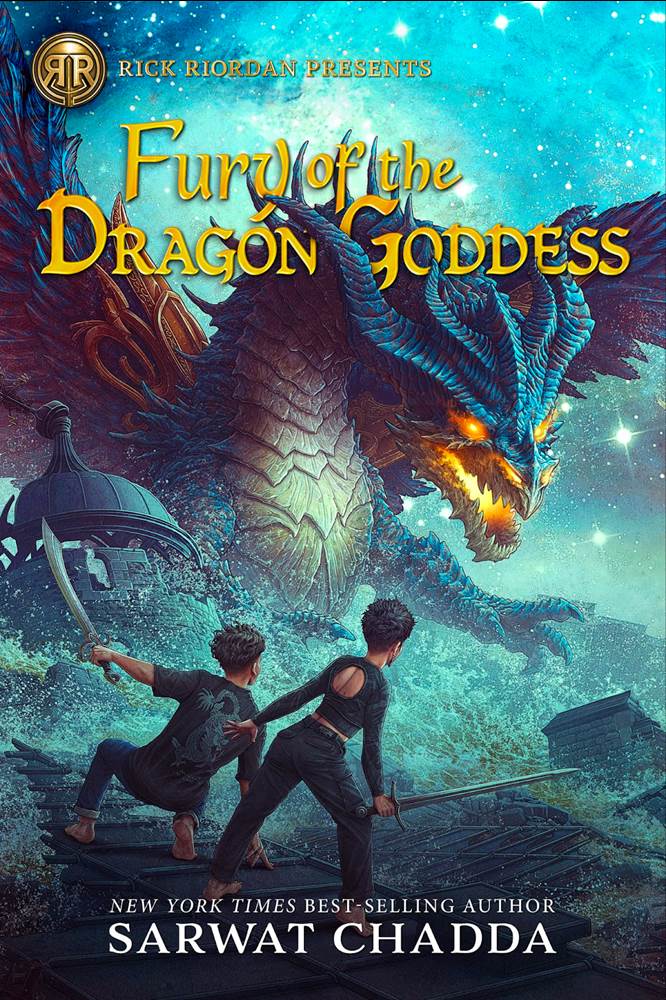Book Review: “Fury of the Dragon Goddess” by Sarwat Chadda
Sarwat Chadda’s Fury of the Dragon Goddess is one of the most exciting middle grade novels this year. The latest book from the Rick Riordan Presents imprint at Disney Books, brings readers back to the world of Sikander ‘Sik’ Aziz. Having saved New York City from the plague god, Sik is on vacation in London with his friend Daoud. However, chaos is on the horizon.
Daoud is an international model, who has provided Sik a free trip, but the thrills and chills will be provided by the ‘Tablet of Destiny’ and the vengeful Mesopotamian god of insanity, Lugal, who is looking to resurrect his mother Tiamat, the great chaos dragon.
Joined by Belet who has been pursuing the ‘Tablet of Destiny’, they encounter the deranged god Lugal at an illegal auction where they successfully gain control of the artefact. Unsure about what the tablet does, Sik accidently makes a wish that will change his life forever.
Accompanied by a demon named Rabisu, the group must learn to work together to stop Lugal and save the world. Every decision will matter, and help will come from a variety of places, but it is the actions of Sik that will either save or doom the world.
Fury of the Dragon Goddess is an epic. In storytelling, character development, and destructive power the readers will need a vacation after completing the book. Chadda has blended the extensive history of Mesopotamian mythology and crafted an unbelievable adventure story that brightens every page in this novel.
Coming off the success of the first book in the series, Chadda lures the reader in with his easy start to what looks like a nice vacation for Sik. Setting the story in London takes Sik out of his home environment, which adds tension to the tale. When everything starts going wrong, and Lugal trashes London, not even the movie Earthquake could equal the cataclysmic destruction inflicted on the city.
As the story layers into the depth of Lugal’s plan, and the relationship between Belet and Sik progresses, the reader will follow with their jaw dropped as Sarwat Chadda thoroughly destroys London. The story is great, but the destruction of the city is cinematic.
Beyond the disaster level moments, what elevates the story beyond the simple explosions, floods, and falling buildings, is the nuanced characters that populate the book. Sik is one of the most fun and enjoyable middle grade characters to hit the page, but he is also a mature devout family member, who is proud of his religion, and devoted to the ones he loves.
The death of his brother is still a scar on him. Sik has been able to come to terms with what he lost, while taking on the mantle of an immortal warrior in the vein of Gilgamesh. He’s a sweet loving kid, not afraid to die, and he is always willing to believe the best in his friends.
Daoud proves that he is more than just a version of Derek Zoolander. From being friends with Mo, to Sik’s friend, Daoud is one of the most enigmatic characters in the series. One would think he doesn’t have much substance, but Chadda makes the reader appreciate and care for Daoud.
Belet is another story. Readers of the first book know that she is a warrior, but the loss of her mother Ishtar in the first book has left a scar on her soul. Much like Sik dealing with the loss of Mo, Belet now must go on without the love and support of her mother. The pain that Belet feels is real, and while Sik knows what that is like, it’s hard to help her, because Sik himself doesn’t know what his feelings for Belet are.
Lugal is the villain for sure, but a reader can have empathy, even for the god of insanity. How Chadda explores what Lugal feels and deals with every day not only provides the depth and detail a lot of villains would never get on the printed page, but it also humanizes this mythic being. Lugal is bad, but readers will see that even the worst of the worst deserve a chance at redemption.
Rabisu is a blood thirsty demon who will stop at nothing but somehow has made friends with Sik. In a tale of epic battles, explosive results, and multiple characters, Rabisu is the humor readers need to enjoy the carnage that is taking place. In many ways, Sik is the hero, but Rabisu is necessary for this story to work.
There is lots to love about Fury of the Dragon Goddess. The action-packed adrenaline of an adventure story, the extended character development that allows the readers to see these characters as real, while allowing the growth of Mesopotamian mythology to inspire young readers to learn more about the characters Chadda uses to further his own narrative.
I really liked Fury of the Dragon Goddess. It is one of those books that readers will not want to put down, and how Chadda explores love through family and friends is heartwarming. Books can be as compelling and thrilling as movies, and Sarwat Chadda’s Sikander Aziz epics are better than a popcorn movie.
There is a twist in the story that I would love to discuss but I don’t want to ruin the joy for the readers. Suffice it to say, Chadda has created another epic saga and I just hope there are more books to come with Sikander Aziz.



